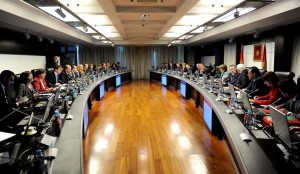A workshop by SIGMA and Montenegro’s Ministry of European Affairs, Podgorica 11-12 May 2017
To step up its EU accession preparations, the newly elected government of Montenegro has established a new Ministry of European Affairs (MEP) since November 2016. In May 2017, the Ministry organized a government-wide workshop on the coordination of strategic planning together with SIGMA, the joint program created by the OECD and the EU to strengthen public management.

The purpose of the workshop was to discuss the requirements and coordination of strategic plans, to link strategy documents and medium-term budget planning and to define goals and indicators for monitoring and reporting. Apart from MEP, senior civil servants from the Secretariat of the Government, the Ministry of Finance and key line ministries attended the workshop. SIGMA experts included practitioners from Estonia, Latvia and Hungary.



